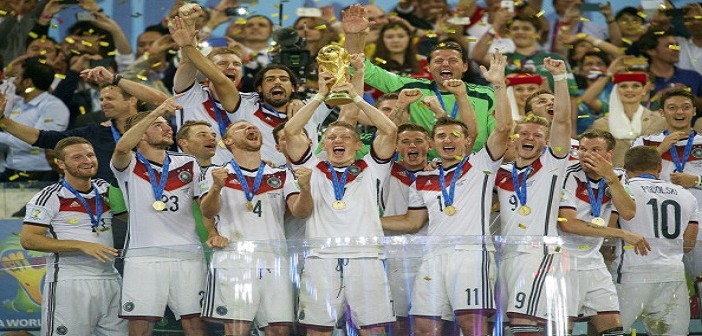IN his latest analysis piece, Will Dyer (@w2Dyer) tracks the trends on the consistency of International squads.
WLB Analysis | Does It Pay To Pick The Same International Players?
It’s International time. England and Ireland plated up a wonderful snooze-fest for us on Sunday afternoon and some of Roy Hodgson’s squad decisions prompted me to analyse the success of International squads in relation to the consistency of call-ups.
Do you pick your side based on recent form or do you persevere with a long-standing core of players? Hopefully I’ll give us some answers by looking at past tournament winners and the consistency of their squads in the years before those victories.
I’m of the opinion that you need a consistent side, a team of players that understand each other’s styles and idiosyncrasies. For want of a better word (and probably coined through years of playing FIFA video games), a side with ‘chemistry’ to succeed, as opposed to a team of players plucked from their domestic sides because they’ve had an impressive few months.
You could argue that Germany’s recent World Cup win and Spain’s golden generation are prime examples of that. But, I’m aware that these are possibly ‘freak’ squads and I should dig a little deeper before making such sweeping statements!
Spain
First let’s take a look at Spain’s squads from 2006-14:
- 2006-08 – 12 players in Spain’s Euro 2008 squad were veterans of their 2006 World Cup campaign. Spain won Euro 2008 in Austria/Switzerland.
- 2008-10 – 14 of the 23 man squad from Euro 2008 were also chosen for Spain’s 2010 World Cup in South Africa. They won the World Cup.
- 2010-12 – 19 reappeared for Euro 2012 in Poland/Ukraine. An incredible feat. Only Carlos Marchena, Joan Capdevila, Carles Puyol, and David Villa missed out, the first two having retired, Puyol being 34 at the time and Villa injured. Spain won Euro 2012.
- 2012-14 – 18 of the 23 from the previous tournament were recalled for the 2014 World Cup in Brazil but Spain exited at the Group Stage.
11 Spanish players were ever-presents in the 23-man squad for Euro 2008, the 2010 World Cup and Euro 2012 – Iker Casillas, Pepe Reina, Raul Albiol, Andres Iniesta, Xavi Hernandez, Fernando Torres, Cesc Fabregas, Xabi Alonso, Alvaro Arbeloa, David Silva and Sergio Ramos.
England
- 2006-08 – 13 of England’s 23-man squad in the Euro 2008 qualifier against Andorra were veterans of the 2006 World Cup. England failed to qualify for the tournament under Steve McClaren.
- 2008-10 – Only 11 of the 23-man squad from the Euro failure two years before made it into England’s 2010 World Cup squad.
- 2010-12 – A meagre eight of England’s 2010 World Cup veterans made it through to Roy Hodgson’s squad for the Euro 2012 Championship.
- 2012-14 – Just 11 of England’s 2012 hopefuls were present in their 2014 World Cup 23-man squad despite being under the same management of Roy Hodgson.
In the period that Spain kept together 11 players across the three tournaments from 2008-2012 England only called up four players for all of those competitions – Ashley Cole, Steven Gerrard, John Terry and Jermaine Defoe.
Germany
- 2006-08 – 15 of Germany’s squad for the Euro 2008 tournament were veterans of their 2006 World Cup squad.
- 2008-10 – Only nine of Germany’s 2008 side returned for the World Cup in South Africa as the side underwent a transition and blooded a raft of new youngsters in the senior side.
- 2010-12 – 14 of Germany’s 2010 World Cup side were rewarded with a place in their Euro 2012 squad.
- 2012-14 – 16 of Germany 2014 world champions had been part of the squad at Euro 2012 showing what that tournament experience can achieve.
Is it a coincidence that Germany won their first tournament since Euro 1996 with their most consistent squad in the last eight years? I would suggest it’s not. They have had a progressive profile since the end of Euro 2008 with a strong core of players being slowly added to year on year and it’s paid off.
Of Germany’s 23-man squad in Brazil nine had also played in the 2010 World Cup and Euro 2012; Manuel Neuer, Sami Khedira, Bastian Schweinsteiger, Mesut Ozil, Lukas Podolski, Miroslav Klose, Thomas Muller, Phillip Lahm and Toni Kroos. Worryingly for the rest of Europe they will probably take around 15 of 2014’s veterans to Euro 2016 and thus they are rightly favourites.
Where Do We Stand
As you can see there isn’t much consistency in England’s International squads from tournament to tournament. Indeed we haven’t had much success in the last two decades which often leads to dismissals and players never being recalled.
Let’s just sum those figures up by adding together the total number of returning players from tournaments 2006-14, the higher the number the more consistent the squads:
Spain: 63 (Two European Championships and one World Cup)
Germany: 54 (One World Cup)
England: 43 (No honours)
There's definitely an argument that England made the right decision by calling up new players because the previous picks did not live up to their potential but, at the same time, how do you know how well a player might play in the international set-up if he is not given more time to gel with his teammates?
England have called up a lot of debutants in the last few years and without a bedrock of continuity in the squad we look unlikely to challenge in the latter stages of the upcoming tournaments.
This is supposed to be an analysis piece but I feel my opinions are worthy of a mention; Jamie Vardy making his England debut at the age of 28 seems rather pointless. At best he will play for four years before retiring from international football and that’s if he even makes it into future squads.
Vardy’s story from non-league to England is fabulous but with another player with a similarly meteoric rise, Charlie Austin, being left on the bench despite being a more proven goalscorer and three years Vardy’s junior why does Austin not get his debut? It makes no sense at all to me and Roy Hodgson has completely lost my backing after that decision.
Squad Consistency Elsewhere
I wrote a blog previously for another site in which I performed a statistical analysis of Squad Consistency v Final Table position in the Football League 2014/15 season. I used the Spearman’s Rank co-efficient to test the correlation between the two datasets and the results showed there to be a very strong positive correlation between using a fewer number of players in a season and gaining more points.
Of the clubs that qualified for the play-offs and won automatic promotion almost all of them used considerably less players than bottom half and relegated sides, for example; Bournemouth used just 24 players whilst Blackpool used 50. Bournemouth finished top, Blackpool finished bottom. That is not me picking and choosing data to satisfy my point, that’s a general trend that was prevalent throughout 80% of the 72 teams.
Of course there are differences between domestic and international football but the stats don’t lie about Spain’s success with a less changed squad over the last decade and England’s woeful recent record at tournaments with squads differing substantially from year to year.



